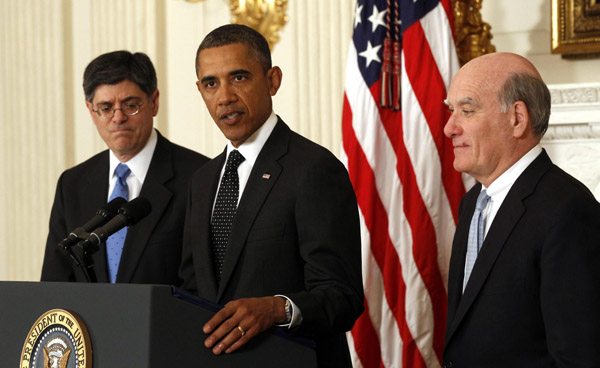Obama changes top aide ahead of re-election
Updated: 2012-01-10 09:39
(Agencies)
|
||||||||
WASHINGTON - US President Barack Obama announced an election year shake-up at the White House on Monday, choosing budget director Jack Lew to replace chief of staff Bill Daley, who resigned after a troubled one-year tenure.
The switch at the top of the White House power chain comes as Obama prepares for a tough re-election battle that will require support from his left-leaning base.
|
 |
|
US President Barack Obama announces Chief of Staff Bill Daley's (R) stepping down after only one year in office at the White House in Washington Jan 9, 2012. Budget director Jack Lew (L) will replace Daley. [Photo/Agencies] |
Daley, who as chief of staff was Obama's top aide, was unpopular with that base, which saw him as too close to big business and too soft on Republicans.
Lew, director of the White House budget office since November 2010, is well-versed in congressional politics and has stronger relations with Democrats on Capitol Hill.
Obama told reporters that Daley had approached him about resigning last week. The president said he did not accept the offer at first, asking Daley to think it over.
Daley decided it was time to return to his native Chicago. He will take on a volunteer role as one of several co-chairs of Obama's re-election campaign, which is based there.
"There is no question I'm going to miss having Bill at my side at the White House," Obama said. "I plan to continue to seek Bill's counsel in the months and years to come."
Daley's departure reflects a shift in White House strategy that has been months in the making.
The former commerce secretary came in last year with a mandate to improve relations with the business community and with congressional Republicans.
Relations with both groups remained rocky, however, and Obama adopted a harder edge against Republicans in the fall after acrimonious negotiations to increase the US debt ceiling brought the country to the brink of default.
The new White House strategy casts Obama as a champion of the middle class running for re-election in November against obstructionist Republicans in Congress. It leaves little room for the kind of conciliation that was part of Daley's original mandate.
"Daley was brought in in part to preside over a strategy that I think was very well intentioned but that simply didn't pan out," said Brookings Institution fellow William Galston.
"If the name of the game from ... now through the election is executing a sharply partisan strategy, then you could argue that someone who doesn't have rich and up-to-date relationships with senior Democrats in Congress might not be the best person to execute the strategy," Galston said.

 Relief reaches isolated village
Relief reaches isolated village
 Rainfall poses new threats to quake-hit region
Rainfall poses new threats to quake-hit region
 Funerals begin for Boston bombing victims
Funerals begin for Boston bombing victims
 Quake takeaway from China's Air Force
Quake takeaway from China's Air Force
 Obama celebrates young inventors at science fair
Obama celebrates young inventors at science fair
 Earth Day marked around the world
Earth Day marked around the world
 Volunteer team helping students find sense of normalcy
Volunteer team helping students find sense of normalcy
 Ethnic groups quick to join rescue efforts
Ethnic groups quick to join rescue efforts
Most Viewed
Editor's Picks

|

|

|

|

|

|
Today's Top News
Health new priority for quake zone
Xi meets US top military officer
Japan's boats driven out of Diaoyu
China mulls online shopping legislation
Bird flu death toll rises to 22
Putin appoints new ambassador to China
Japanese ships blocked from Diaoyu Islands
Inspired by Guan, more Chinese pick up golf
US Weekly

|

|






